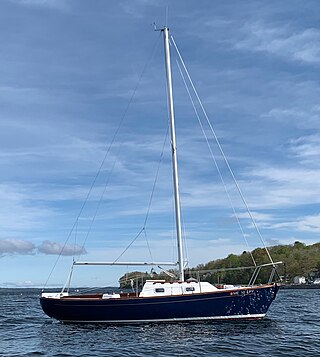Related Research Articles

The Cal 24 is an American trailerable sailboat that was designed by C. William Lapworth as a Midget Ocean Racing Club (MORC) racer and first built in 1958.
The Columbia 22 is an American trailerable sailboat that was designed by William Crealock and first built in 1966.
The Columbia T-23, or Columbia T23, is an American sailboat that was designed by Australian Alan Payne and first built in 1973. The "T" designation indicates that the boat is designed to be trailerable.
The Coronado 23, also called the Sailcrafter 23, is an American trailerable sailboat that was designed by William Crealock as cruiser-racer and first built in 1969.
The Ericson 25, also called the Ericson 25 Mark I is an American trailerable sailboat that was designed by Bruce King as a cruiser and first built in 1973.
The Gloucester 22 is an American trailerable sailboat that was designed by Stuart Windley and Harry R. Sindle as a cruiser and first built in 1983.
The Newport 212 is an American trailerable sailboat that was designed by Harry R. Sindle as a pocket cruiser and first built in 1972.
The Herreshoff America, also called the Herreshoff America 18, is an American trailerable sailboat that was designed by Halsey Chase Herreshoff as a cruiser and first built in 1971.
The Irwin 23 is an American trailerable sailboat that was designed by Ted Irwin as a cruiser and first built in 1968.
The South Coast 22 is an American trailerable sailboat that was designed by Carl Alberg, James Monroe and Hollis Metcalf as a pocket cruiser and first built in 1968.
The Morgan 22 is an American trailerable sailboat that was designed by Charley Morgan as a racer-cruiser and first built in 1968.
The Nimble 20, is an American trailerable sailboat that was designed by Edward S. Brewer as a pocket cruiser and first built in 1986.
The O'Day 19 is an American trailerable sailboat that was designed by John Deknatel of C. Raymond Hunt Associates, as a racer-cruiser and first built in 1979.
The O'Day 26 is an American trailerable sailboat that was designed by C. Raymond Hunt and Associates as a cruiser and first built in 1983.
The O'Day 222 is an American trailerable sailboat that was designed by C. Raymond Hunt Associates as a cruiser and first built in 1984.
The Precision 21 is an American trailerable sailboat that was designed by Jim Taylor as a cruiser and first built in 1986.

The Quickstep 24 is an American trailerable sailboat that was designed by Edward S. Brewer as a cruiser and first built in 1976.
The S2 6.8 is an American trailerable sailboat that was designed by Don Wennersten and Arthur Edmunds as a racer-cruiser and first built in 1976. The designation indicates the approximate length overall in meters.
The Slipper 17 is an American trailerable sailboat that was designed by Nick Hake as a pocket cruiser and first built in 1981.
The Sovereign 17 is an American trailerable sailboat that was designed by the Sovereign Design Group as a daysailer and pocket cruiser and first built in 1980. It was sold under a variety of names, including the Sovereign 18, Sovereign 5.0, Sovereign 5M and Adventurer 17.
References
- 1 2 3 4 5 6 McArthur, Bruce (2021). "Quickstep 21 sailboat". sailboatdata.com. Archived from the original on 12 November 2021. Retrieved 12 November 2021.
- 1 2 3 4 5 6 7 8 Henkel, Steve: The Sailor's Book of Small Cruising Sailboats, page 123. International Marine/McGraw-Hill, 2010. ISBN 978-0-07-163652-0
- ↑ McArthur, Bruce (2021). "Quickstep Sailboats (USA)". sailboatdata.com. Archived from the original on 29 August 2021. Retrieved 12 November 2021.
- ↑ McArthur, Bruce (2021). "C. E. Ryder 1976 - 1990". sailboatdata.com. Archived from the original on 16 March 2021. Retrieved 12 November 2021.
- 1 2 "A Step in the Right Direction". Cruising World. September 1988. Retrieved 12 November 2021.
- ↑ McArthur, Bruce (2021). "Quickstep Owners Group". sailboatdata.com. Archived from the original on 29 August 2021. Retrieved 12 August 2021.